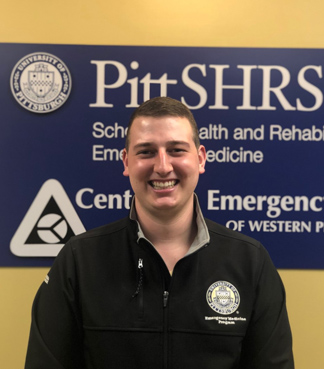
Hometown: Churchville, Pa.
Undergraduate: University of Pittsburgh, BS in Emergency Medicine
Can you tell me a little bit about yourself before you came to Drexel?
I grew up in Bucks County, Pa., which is 35 minutes northeast of Philadelphia. At a young age, I fell in love with science class and eventually decided that I wanted to try to become a physician. I attended Council Rock High School South, where I dedicated a lot of my time to football. Whether it was weightlifting in the offseason, practicing or playing games, football was always something that I loved. After high school, I decided to continue my education at the University of Pittsburgh. My major was emergency medicine, which is a unique program at Pitt. It allowed me to obtain a paramedic certification and flight paramedic certification. I took a gap year after graduation and worked full time as a paramedic while I applied to medical school.
What drew you to medicine in general, and to the College of Medicine specifically?
When I was 10 years old, I had a minor surgery at CHOP. Since it was my first surgery, I was extremely nervous, and the anesthesiologist took the time to explain everything to me. Instead of talking solely to my parents, he took the time to listen to my concerns. He was so nice and compassionate that I decided that I wanted to be a doctor like him. From that moment on, I was interested in the medical field and in love with the idea of being a physician.
When it came time to finally apply for medical school, I knew that I wanted to attend a school in Philadelphia. With all of the resources and educational opportunities available here, there is no better city in the world to obtain a medical education. I quickly knew that Drexel was the perfect place for me. The College of Medicine maintains values that align very well with my own personal values. Additionally, the diverse student body, staff and patient population will allow me to become a culturally competent physician who treats the patient holistically, considering more that just their medical history.
What did you study as an undergraduate? How do you think those studies, and any work or continuing education experiences you had prior to medical school, will prepare you for this next step in your academic career?
At Pitt I studied emergency medicine, which allowed me to obtain my paramedic certification. My experience working on an ambulance proved to be invaluable. My educational and work experiences have allowed me to function as a paramedic in urban, suburban and rural environments. Most importantly, instead of being confined to a hospital or office setting, I was able to provide care in the community. A sick patient that I treat may see 50+ health care providers throughout their course of treatment, but I am the only one that has the chance to see the community where they live firsthand. I could see the different psychosocial factors affecting each patient, allowing me to provide more holistic care.
I was told you founded a nonprofit to help older adults learn to use technology for enhanced communication. Please tell me about the organization.
During my undergraduate years, I co-founded Starszy Education Inc., with Matthew Kent, who is also a member of the College of Medicine’s class of 2025. The goal of our organization is to address the issue of social isolation in the elderly population through technology education, at no cost to participants. Studies have shown that social isolation in senior citizens can lead to a decrease in their mental health and may even lead to an increase in mortality. At Starszy Education, we look to close the technology gap between our generation and senior citizens. While many Americans can contact loved ones at any hour of the day, the technology gap leaves senior citizens as an exception, which leads to loneliness. This became even more apparent during the COVID-19 pandemic.
Our organization is based in Pittsburgh, Pa., and we work in conjunction with the City of Pittsburgh Senior Centers. With the help of college student volunteers, we run classes that show senior citizens how to use technology. We start with turning the iPads on and off, and by the end our participants are able to FaceTime family members, stay connected with Facebook, and order packages using Amazon. We have even helped several seniors file their taxes online.
At the end of the class, we donate as many iPads as possible so they can continue to utilize the technology free of cost. We currently work with multiple senior centers and hope to continue to expand throughout the entire state of Pennsylvania.
What skills from your nonprofit experience will you bring with you to medical school?
Starszy Education allowed me to recognize that there are things in everyday life that I take for granted. When I feel sick, I can Google urgent care locations or set up an online consultation, because I’ve been taught how to use the technology and I have the means to afford the technology. Our organization aims to minimize these disparities. As a physician, I hope to recognize psychosocial disparities that play into my patients’ health, and address more than just their medical needs.